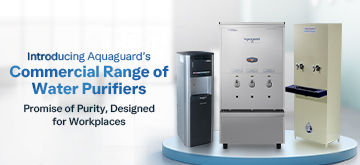
Understanding the Difference Between Commercial and Industrial Water Filters
PUBLISHED ON: 03-Oct-2025
Whether it’s for drinking, cooking, or supporting large-scale operations in industries, purified water is a need that cannot be overlooked. However, the quantity and type of water required can vary greatly depending on where it’s being used. A school or office needs purified drinking water for students and employees, while a factory may need thousands of litres of filtered water every hour for its machines and processes.
This is why we have commercial water filtration systems and industrial water filters. Both are designed to improve water quality, but they serve very different purposes. Let’s understand them in simple terms to know which one is right for your needs.
What is a Commercial Water Filtration System?
A commercial water filtration system is designed for places like offices, restaurants, schools, hotels, gyms, hospitals, or any other setup where many people need safe drinking water every day.
Also read: Commercial Water Purifiers: Understanding How They Work
Types include:
- Commercial RO Water Purifiers – Ideal for areas where the water supply has high TDS (Total Dissolved Solids) or hardness.
Ø Aquaguard Prima 50 B: The Aquaguard Prima 50 B is a reliable commercial RO water purifier designed for areas with high TDS or hardness in water. With 7 stages of purification, it delivers consistently safe drinking water. Its self-cleaning system keeps the purifier fresh and low-maintenance, making it ideal for commercial spaces, small industries, offices, and institutions.
- Commercial UV Water Purifiers – Suitable for water with microbial impurities, usually in areas with a municipal water supply.
Ø Aquaguard Absolute UV: Perfect for places with a municipal water supply, the Aquaguard Absolute UV is a commercial UV water purifier that removes harmful viruses and bacteria with in-tank UV technology. Biocote protection prevents microbial growth around the unit, ensuring hygiene. With safe storage and reliable performance, it’s well-suited for offices, schools, and restaurants where microbial safety is a priority.
- Storage Water Coolers With Inbuilt Purifiers – Perfect for places where both cooling and purification are needed, such as schools, offices, and canteens.
Ø Aquaguard Pure Chill 80 SS: The Aquaguard Pure Chill 80 SS combines purification and cooling in one unit, making it the ideal storage water cooler with an inbuilt purifier for schools, offices, and canteens. Its stainless-steel body ensures hygiene and durability, while the 80-litre tank provides a constant supply of chilled, purified water. With UV, RO, and CUZN purification, it guarantees safe and refreshing hydration.
What is an Industrial Water Filtration System?
An industrial water filtration system is designed for heavy-duty use, mainly in factories, large-scale manufacturing plants, food processing units, or any setup where water is required in very large quantities.
Unlike commercial systems, these industrial water filters go beyond just drinking water; they can be used in production processes, boilers, cooling systems, and more.
Their capacity usually starts from 100 LPH and can be customised depending on the industry’s requirements.
Also read: What is a Skid-Mounted RO Plant Commercial Water Purifier? Benefits, Features & Applications
One of the best industrial filtration systems is-
Ø Aquaguard 500 LPH RO Plant Commercial Water Purifier: This is a high-capacity solution for large establishments requiring safe drinking water. It comes as a single integrated unit, pre-wired and pre-piped for faster installation. The microprocessor-based control ensures easy operation, while the pre-treatment module eliminates suspended solids to protect membranes. With auto start-stop based on tank water levels, it ensures efficient use. Designed for centralised purification, it can connect to multiple dispensing points.
Key Differences Between Commercial and Industrial Water Filters
1. Purpose
- Commercial filtration – Mainly for drinking water and daily use in offices, schools, restaurants, gyms, etc.
- Industrial filtration – It is used for the same purpose as other commercial water purifiers, but it has a centralised purifying unit that can be connected with ease to the network of other water dispensing units.
2. Capacity
- Commercial systems handle 25–100 LPH.
- Industrial systems start at 100 LPH and go much higher.
3. Installation & Space
- Commercial water purifiers are compact, wall-mounted, or floor-standing units.
- Industrial filtration systems are larger and require more dedicated space.
Which One Do You Need?
The choice depends on your requirement:
- If you run an office, school, café, or gym where 20–200 people need drinking water daily, a commercial drinking water filtration system is the right fit.
- If you run a factory, large-scale industry, or a business where water is used in production and operations, you’ll need an industrial water filtration system.
Why Does the Difference Matter
While it might seem that commercial water purifiers and industrial water filters are the same, they are actually designed for different purposes. Choosing the wrong one can result in either overspending or insufficient capacity.
By understanding the difference, you can ensure:
- Adequate water supply
- Safe drinking water for people
- Proper use of resources without unnecessary costs
Frequently Asked Questions
1. What is the main difference between commercial and industrial water filters?
Commercial filters are mainly for drinking water in offices, schools, restaurants, etc., while industrial filters are for large-scale use in factories and production units.
2. How much water can a commercial water purifier filter?
Most commercial water filtration systems have a capacity between 25 LPH and 100 LPH, which is enough for medium-sized establishments.
3. Do industrial water filtration systems also provide drinking water?
Yes, these water filtration systems can provide drinking water for large water needs.
